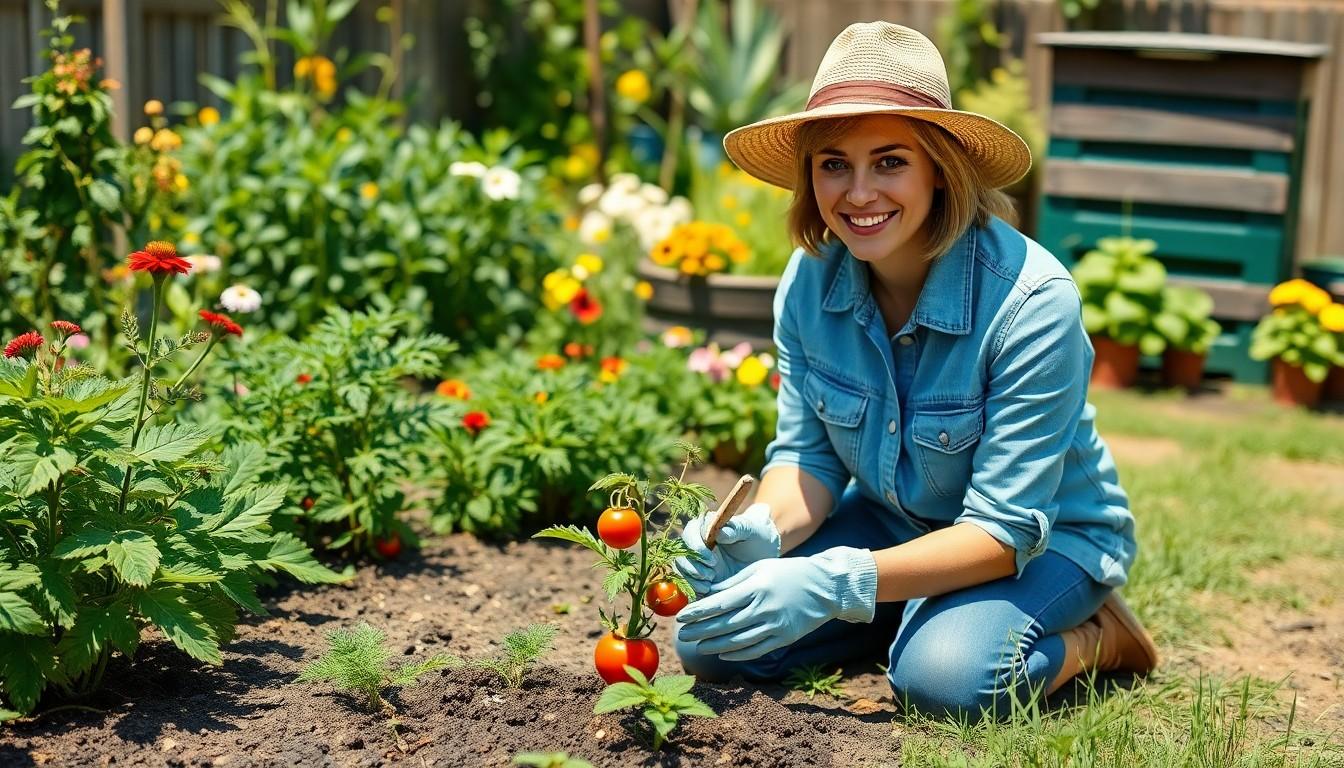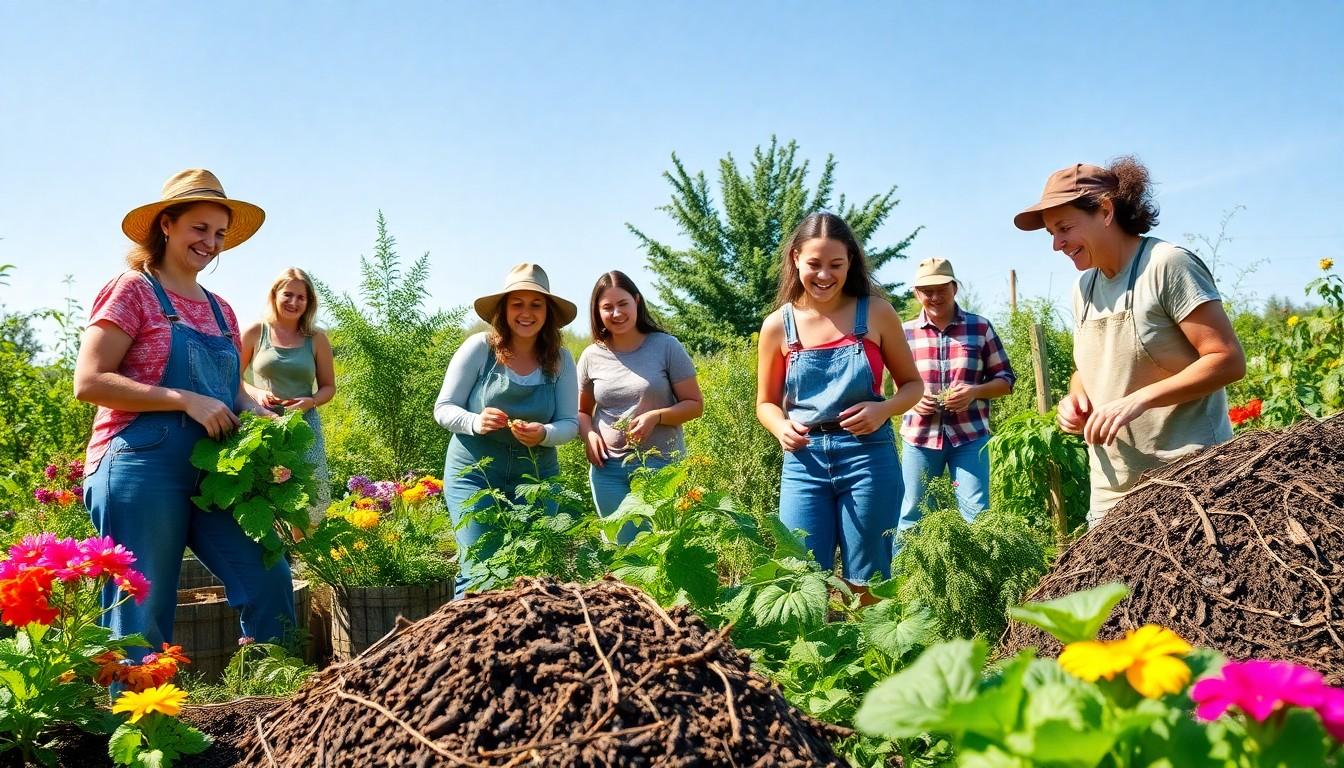Phone:
(701)814-6992
Physical address:
6296 Donnelly Plaza
Ratkeville, Bahamas.

In a world where “organic” is the new black, organic gardening methods are sprouting up faster than weeds in a neglected garden. Imagine digging your hands into rich, earthy soil while knowing you’re nurturing plants that are as pure as your grandma’s secret cookie recipe. It’s not just about growing veggies; it’s a lifestyle choice that can turn even the most reluctant gardener into a green-thumbed guru.
Organic gardening methods emphasize natural processes and environmentally friendly practices. These methods focus on nurturing soil health, enhancing biodiversity, and promoting the use of organic materials. Composting remains a fundamental technique, allowing gardeners to recycle kitchen scraps and yard waste into nutrient-rich compost.
Crop rotation enhances soil fertility and helps prevent pest accumulation. Utilizing companion planting improves plant growth by maximizing space and deter pests through plant diversity. Hand-picking pests and encouraging beneficial insects like ladybugs naturally manage pest populations without chemicals.
Mulching plays a critical role as well, reducing weeds and retaining soil moisture. Organic fertilizers provide necessary nutrients while maintaining soil integrity. Certified organic seeds support the overall organic gardening philosophy, ensuring that all plantings contribute to a healthy ecosystem.
Using natural pest control methods like neem oil or insecticidal soap effectively manages common garden pests. Organic gardening practices hone in on creating a balance in the garden ecosystem, fostering resilience against diseases and pests. Biodynamic gardening offers an additional layer, intertwining organic practices with a holistic approach that considers cosmic rhythms.
Community involvement often enhances organic gardening experiences. Many local cooperatives and gardening groups offer resources and support for novice and experienced gardeners alike. By implementing organic gardening methods, individuals contribute to sustainability and health, providing them with the satisfaction of cultivating fresh, chemical-free produce.

Organic gardening offers numerous advantages that extend beyond personal satisfaction. Engaging in organic methods promotes healthier ecosystems and fosters a stronger connection with nature.
Organic gardening significantly benefits the environment by reducing chemical runoff. Practices like composting and crop rotation enhance soil quality. Healthy soil absorbs carbon, contributing to climate change mitigation. Using natural pest control methods supports biodiversity and protects beneficial insects. Additionally, minimized synthetic fertilizers and pesticides reduce environmental toxins in water sources. Overall, organic gardening nurtures ecosystems, fostering sustainability.
The health benefits of organic gardening are substantial. Organic produce contains higher levels of essential nutrients, as it’s grown without synthetic chemicals. Eating organic fruits and vegetables lowers exposure to harmful residues found in conventional produce. In addition, gardening itself promotes physical activity, reducing stress and enhancing mental well-being. Fresh, chemical-free crops lead to better diet choices, benefiting overall health. Organic gardening encourages consumption of seasonal, local produce, further boosting nutrition.
Organic gardening thrives on methods that restore and maintain natural ecosystems. Key techniques guide gardeners in creating healthy environments for plants.
Soil preparation forms the foundation for successful organic gardening. Assessing soil quality involves testing pH levels and nutrient content. Adding organic matter, such as compost, enriches soil structure and promotes beneficial microorganisms. Utilizing cover crops adds nutrients while preventing soil erosion. Rotating crops every season improves soil health by breaking pest and disease cycles. Practicing mulching conserves moisture and suppresses weeds. Ultimately, healthy soil ensures robust plant growth and resilience.
Pest management focuses on prevention and natural solutions rather than harmful chemicals. Encouraging beneficial insects like ladybugs and lacewings creates a natural balance. Planting a diverse range of species attracts these allies, which prey on harmful pests. Implementing companion planting pairs plants that deter pests naturally. Neem oil and insecticidal soaps serve as effective organic treatments when pests appear. Monitoring plants regularly helps identify issues early, allowing for timely action. Through these methods, gardeners maintain a thriving ecosystem while minimizing pest damage.
Organic gardening methods prioritize natural techniques that enhance plant health and promote sustainability. These practices are accessible to all gardeners looking to cultivate a thriving ecosystem.
Companion planting involves growing different plant species together for mutual benefits. Some plants repel pests, while others attract beneficial insects. An example includes planting marigolds alongside tomatoes to deter nematodes. This strategy not only enhances pest management, but it also boosts overall garden health. Moreover, pairing certain crops can improve nutrient uptake. For instance, beans enrich the soil with nitrogen, benefiting corn’s growth when planted nearby. Engaging in companion planting encourages biodiversity and creates a more resilient garden.
Crop rotation is critical for maintaining soil nutrients and preventing pest buildup. Switching crops each season prevents the depletion of specific soil nutrients. For example, after growing legumes, which fix nitrogen, transitioning to leafy greens can maximize soil health. Rotating crops disrupts pest cycles, reducing the need for chemical interventions. Implementing a three-to-four-year rotation plan ensures sustained soil fertility and enhances microbial activity. Additionally, this practice minimizes disease risks since pathogens often thrive in consistent crop plantings. Adopting crop rotation fosters a sustainable approach to gardening.
Choosing the right tools boosts efficiency in organic gardening. Hand trowels serve well for planting and weeding, providing precision in handling soil. Pruning shears allow for easy trimming of plants, promoting healthy growth and air circulation.
Gardeners benefit from soil tests to assess pH levels and nutrient quality. Soil testing kits can identify deficiencies, guiding amendments to enhance fertility. Compost bins offer a sustainable way to recycle kitchen scraps and yard waste, creating nutrient-rich amendments.
Mulching tools help maintain moisture levels and suppress weeds. Organic mulch, such as wood chips or straw, breaks down over time, enriching soil. Watering cans with long spouts facilitate targeted watering, minimizing waste.
Educational resources play a critical role in successful organic gardening. Books like “The Soil Will Save Us” educate on soil health and regenerative practices. Websites dedicated to organic gardening provide tips, techniques, and troubleshooting advice.
Local agricultural extension services offer invaluable guidance tailored to specific regions. Workshops and community gardens foster learning and sharing among gardening enthusiasts. Online forums allow for engagement with fellow gardeners, exchanging ideas and experiences.
Organic gardening supplies are readily available at garden centers and online retailers. Seeds labeled as organic ensure chemical-free growth from the start. Fertilizers derived from natural sources, such as bone meal and fish emulsion, support healthy plant development without synthetic chemicals.
Utilizing these tools and resources nurtures a thriving organic garden, aligning with sustainable practices while enhancing the overall gardening experience.
Embracing organic gardening methods offers a fulfilling journey towards sustainability and health. By prioritizing natural processes and fostering biodiversity, gardeners can create vibrant ecosystems that thrive without synthetic chemicals. These practices not only enhance soil quality and reduce environmental impact but also promote personal well-being through physical activity and the joy of growing one’s own food.
With the right techniques and tools, anyone can cultivate a successful organic garden. Community involvement and access to local resources further enrich the experience, making organic gardening an accessible choice for all. Ultimately, this approach deepens the connection to nature while contributing to a healthier planet.